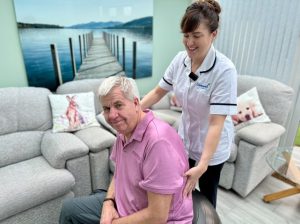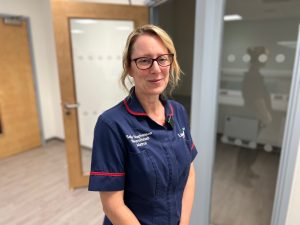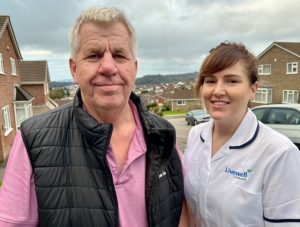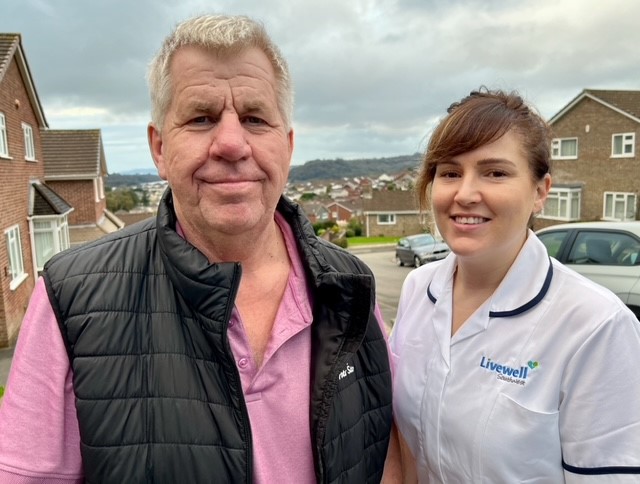Former delivery driver Steve Hancock from Plymouth used to walk more than a hundred miles a week and says he felt the fittest he had ever been.
That was until March 2024, when he woke in the night.

Steve with Physiotherapist Cara Palfreyman
He recalls: “I’d had a headache for four or five days and my wife kept telling me to speak to a doctor. One night I reached out to get something off my bedside table and I just fell out of bed. I couldn’t stop myself because the left-hand side of my body was all numb.”
Steve had suffered a stroke, which is when blood stops flowing to a part of your brain. It can affect things like speech and movement and take a long time to recover.
Paramedics rushed him to hospital as a stroke can be life-threatening. The specialist stroke team from University Hospitals Plymouth NHS Trust were waiting at the door of the Emergency Department for him. He was scanned before being taken to the operating theatre to have blood clots removed from his brain. After three weeks at Derriford hospital, he was transferred to Wembury ward at Mount Gould to continue his rehabilitation. Two months later, he still had limited movement in his left arm but was able to walk out of the stroke rehabilitation unit, with the use of a frame.
That was when he met the Community Neuro Rehab Team (CNRT) run by Livewell Southwest. They assess and treat people over 16 who have been formally diagnosed with a stroke and are registered with a GP in Plymouth, the South Hams and West Devon.
The team of physiotherapists, occupational therapists, speech and language therapists, psychologists, medics and nurses, work together to provide individualised rehabilitation to ensure people can live independently at home.
Neuro Rehab Matron Sally Stephenson said: “Once a patient has been discharged from a hospital setting like Derriford, we then meet them at home. It is important we assess their needs, talk about the goals they want to achieve, and meet their family too, as they are important in a patient’s rehab journey.”

Sally Stephenson Matron
Physiotherapist Cara Palfreyman said: “We worked on Steve’s strength and balance as he was desperate to get back to work. We also spent lots of time in the kitchen so we could adapt the way he cooks and cleans to get back to living how he used to before the stroke. It means the world to us to see people like Steve now active in the community.”

Steve with Physiotherapist Cara Palfreyman
Steve can drive again and has a job at the local supermarket. He said: “I can’t thank the team enough. They keep your spirits up. You soon fall in a big hole with a stroke because you’ve lost everything. To come home and sit alone all day is not good.
“I’ve got a purpose in life now with a job. It’s absolutely brilliant. I couldn’t have got to where I am without them.”
Previously, the CNRT would have only seen people who had a mild or moderate impairment following a stroke. Following further investment in autumn 2024, the team are now looking at supporting every stroke survivor who is registered with a GP in Plymouth, the South Hams and West Devon.
Neuro Rehab Matron Sally Stephenson said: “Hopefully it will mean people who have had a stroke will have a shorter stay in hospital, and receive the intensity of rehabilitation that they need, in their own home or at a community facility. All the evidence points to that promotes a quicker recovery. It will also improve patient flow through the acute hospitals.”
The team also assess and treat patients with complex neurological diagnoses who are registered with a Plymouth GP. They are also due to expand this service to the South Hams and West Devon.


